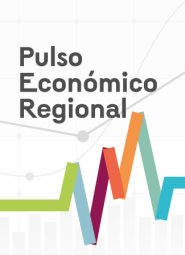Working Papers on Economics - Domestic Effects of the Pandemic-Induced Container Freight Disruption in a Globalized World
The series Working Papers on Economics is published by the Office for Economic Studies at the Banco de la República (Central Bank of Colombia). It contributes to the dissemination and promotion of the work by researchers from the institution. This series is indexed at Research Papers in Economics (RePEc).
On multiple occasions, these works have been the result of collaborative work with individuals from other national or international institutions. The works published are provisional, and their authors are fully responsible for the opinions expressed in them, as well as for possible mistakes. The opinions expressed herein are those of the authors and do not necessarily reflect the views of Banco de la República or its Board of Directors.
The series Working Papers on Economics contributes to the dissemination and promotion of the work by researchers from the institution. On multiple occasions, these works have been the result of collaborative work with individuals from other national or international institutions. This series is indexed at Research Papers in Economics (RePEc). The opinions contained in this document are the sole responsibility of the author and do not commit Banco de la República or its Board of Directors.
Abstract
The Covid-19 pandemic severely disrupted the maritime transportation industry, leading to historic surge in container freight rates, which only returned to normal in 2023. In this paper I examine the welfare effects on a particular country, Colombia, of the observed disruption in international freight rates during the 2020-2023 period. For this, I use a quantitative model of international trade with out-of-steady-state transitional dynamics and a global production network, along with an instrumental variable approach to estimate a trade elasticity to freight. I quantify both the direct effects of freight increases on goods transported to and from Colombia, as well as the indirect impact of heightened rates on routes across the rest of the world. The freight disruption caused a welfare loss of 0.4%, attributable solely to the direct effects, as the indirect impact simultaneously enhances Colombia’s relative trade openness, thereby compensating for the increased shipping costs globally.





























































